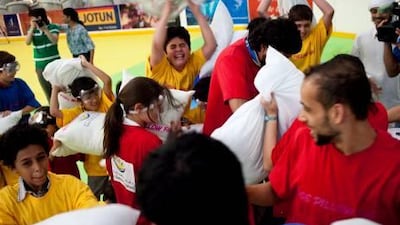Retain residents and attract visitors. In 50-degree heat. And over the summer holiday.
That, in a nutshell, is the lofty ambition the Dubai Summer Surprises team has aimed to realise year on year, for a quarter of a century. A look back at the shopping and entertainment festival’s history — and numbers — proves it’s very nearly succeeded.
The year is 1998. Dubai is inching its way upwards on the global tourism map, thanks in part to Dubai Shopping Festival. DSF began in the winter of 1996 with the aim of drawing more visitors to the UAE at a time when the weather is at its most pleasant and before the scorching summer sees the emirate at its emptiest.
There is only one problem, though: the word “emptiest” does not quite figure in this city of superlatives. And so Dubai Summer Surprises comes into being, running for the duration of the summer — and offering massive discounts, high-profile performances and tonnes of indoor family-friendly activities, all overseen by its cheery yellow mascot, Modhesh.

Obviously the first-ever DSS does not outperform the first-ever DSF, which reportedly attracted 1.6 million shoppers, but it still manages to attract more than 600,000 visitors who spend Dh850 million in its debut year, with similar figures reported in 1999 and the early noughties.
The year is 2003. Dubai does not want to be labelled as just another shopping destination, so DSS steps in and introduces Mind’s Pleasure seminars to its calendar.
Open to the public, the seminars offer tips on social, economic and spiritual issues. One of the most memorable speakers in this series, Kevin Abdulrahman — voted Best Motivational Inspirational and Leadership Speaker in the Middle East — gives a talk called “Get Inspired, Get Informed and Get Going” during the event in 2012.
Flash forward to 2005. The Collectors, a DSS-sponsored exhibition, is launched, featuring eccentric collectibles from across the Gulf; think classic cars, cultural artefacts, swizzle sticks and phone cards. In 2010, for example, Dubai homemaker Fathia Al Qassab showcases her collection of Kinder Surprises — the plastic toys enclosed in Kinder chocolate eggs — as part of BurJuman mall’s DSS activations.
The year is 2008. DSS is converted into a government body. In previous years, the festival had been administered directly by the emirate's Economic Department, but its growth prompted the government to establish a stand-alone autonomous office to run the event — to great success. The festival welcomes 2.1 million visitors, who collectively spend Dh3.25 billion over the summer. That same year, Mall of the Emirates famously has to increase its parking spaces by 200 to accommodate shoppers.
The following year, 2009, is a tough one, following the financial crash. Undeterred, the Dubai Shopping Malls group dedicates a total of Dh5m in raffles, while the Department of Tourism and Commerce Marketing launches a kids-go-free offer to coincide with DSS. From July to September, one child from each family enjoys free flights, meals, hotel stays and entrances to attractions. In 2010, Emirates becomes the first airline in the Gulf to arrange online tourist visas to coincide with DSS in a bid to boost visitor numbers.
These efforts pay off, as reflected in the numbers recorded in 2011 and 2012: four million visitors spend Dh9bn and 4.36 million visitors spend Dh12.3bn, respectively. Despite DSS only running for a month in 2012, so as not to overlap with Ramadan, Majid Al Futtaim, the biggest operator of shopping malls in the UAE reports it as its most profitable festival so far.

Raffles and retail therapy aside, DSS has also made a name for itself in the entertainment arena. With outdoor concerts out of the question in the summer months, the festival instead brings family-friendly shows and high-profile performers to malls and other indoor arenas. From a giant pillow fight in The Dubai Mall in 2013 and shows by characters from Transformers in 2014, to performances by Jaden and Willow Smith in 2015 and Zendaya in 2017, the festival is a study in entertainment variety.
The year is 2018. Dubai is now home to a host of new attractions, from IMG Worlds of Adventure to Legoland. These along with 30 of Dubai’s best-loved attractions come together to launch the Dubai Pass to coincide with DSS. The pass offers families savings of up to 60 per cent, cementing the festival’s going-beyond-retail philosophy.
Then along comes the pandemic. While the 2020 festival goes ahead as usual — starting soon after the UAE’s stay-at-home measures lifted — a number of brands introduce or expand their online offerings in the summer, while other temporarily suspended acts also choose to reopen during DSS, most notably the popular acrobatic water show La Perle.
Food is the trump card in DSS’s 2021 arsenal, with the event launching the first Summer Restaurant Week last year. This programme brings some of the city’s best restaurants — such as Carnival by Tresind and Social by Heinz Beck — to serve up limited-time menus at lower prices. That year also includes high-octane performances by Arabic stars Balqees, Saif Nabeel and Mohammed Assaf at the Dubai World Trade Centre; and Bollywood singer Sunidhi Chauhan and Pakistani maestro Rahat Fateh Ali Khan at the Coca-Cola Arena.
The venue’s general manager Mark Jan Kar told The National at the time: “We work together with … Dubai Summer Surprises to find ways to drive benefit to the city.”
That retention-attraction ambition — despite the 50°C heat and over the summer holiday — seems to be working, then.
DSS is celebrating its 25th anniversary this year. More details on sales, raffles and performances can be found here and on www.dss.ae













